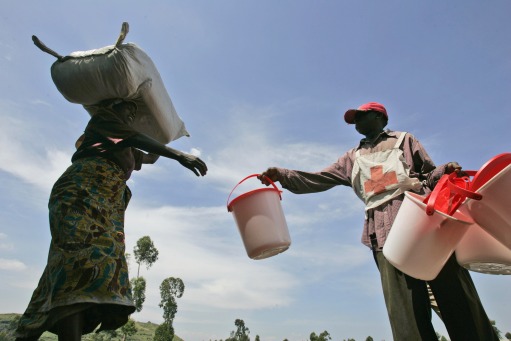Humanitarian situation in DRC reaching crisis point

Christian Aid has warned of a rapidly deteriorating humanitarian situation in the Democratic Republic of Congo.
Peace talks in neighbouring Uganda have failed to bring a halt to fighting between the DRC national army (FARDC) and the M23 rebel group in eastern parts of the country.
More than 4,200 people have been forced to leave their homes and flood the areas around Goma as a result of fighting, particularly around Kibati, around 15km to the north.
This week, the United Nations peacekeeping operation in the DRC introduced a security zone around Goma to protect the civilian population.
Christian Aid's partner organisation, CBCA, reports large-scale displacement, with many people staying in schools and other temporary shelters.
"The population lives in a high level of continual psychological stress, trapped close to the battlefield and with no access to their fields for livelihood activities," said Chantal Daniels, Christian Aid senior policy and advocacy officer.
"Recent advances against the reportedly weakened M23 means that the morale of the national army is very high at present. Among citizens and the army, there is much optimism about recent advantages against the M23."
Ms Daniels said further attacks had been carried out by the ADF-Nalu group around Beni, North Kivu, prompting around 66,000 people to cross the border into Uganda.
Since January, over 24,000 families have arrived in Kalima and Punia in DRC's Maniema province, and more are being forced out of South Kivu as a result of fighting between the national army and rebel group Mai Mai Raiya Mutomboki.
Christian Aid is supporting around 16,400 internally displaced households across the North and South Kivu and Maniema, by providing them with food, water and other basic items. Assistance is also being given to victims of gender based violence.
"The impact of the current fighting on local populations and displaced people close to the frontlines is disastrous," Ms Daniels warned.
"Many of those fleeing the violence already have been forced to leave their homes and farms several times this year - something no coping mechanism or resilience programme is able to deal with."
Humanitarian assistance has been severely hindered in Rutshuru and Nyiragongo territory due to heightened security concerns. The two areas have been officially declared red zones, limiting the access of NGOs.
"This severely complicates access for humanitarian organisations providing assistance, and is taking a severe psychological toll on local civilians who consistently have to leave all their belongings behind, risking their homes being destroyed and their assets and land pillaged," said Ms Daniels.
"They are forced into making near-impossible decisions: defending themselves or defending their livelihoods."
Ms Daniels said it was doubtful that FARDC and M23 rebels could be brought back to the negotiating table soon, and that the problem remained that peace talks were not currently involving the other armed groups.
She was also sceptical about the impact of the UN's decision to appoint a Foreign Intervention Brigade to neutralise the DRC's armed groups.
"Military operations must form part of a robust political process and a wider strategy on peace and security in the DRC and the Great Lakes region as a whole, and, simultaneous international efforts are needed to address security and assistance for the population affected by these clashes," she said.











